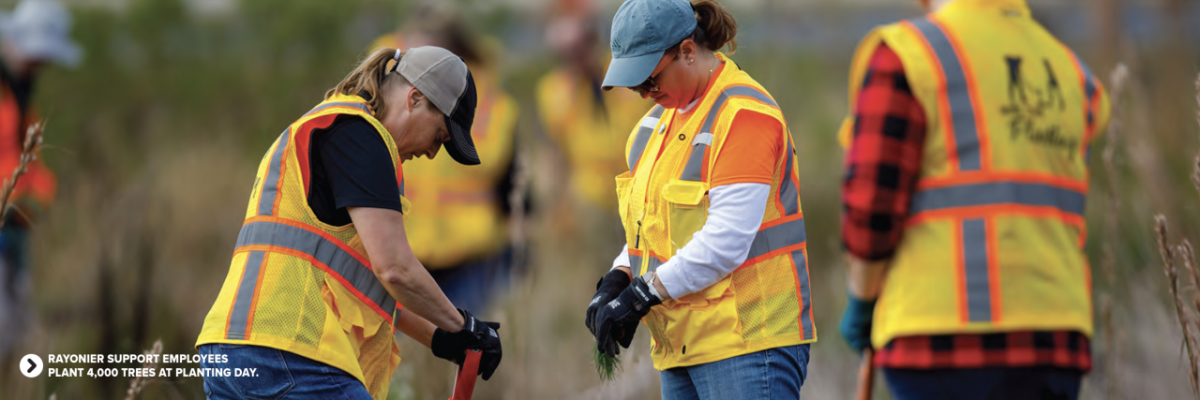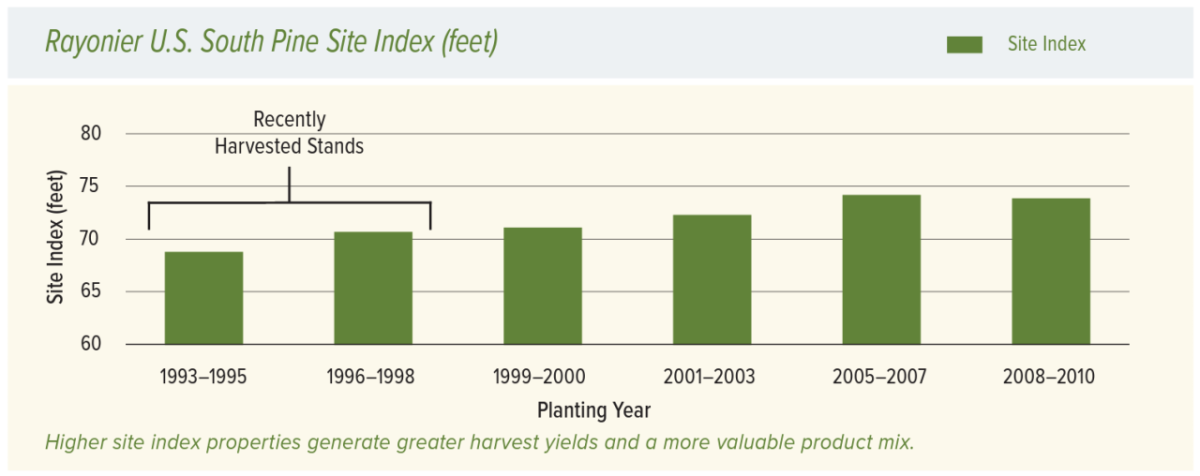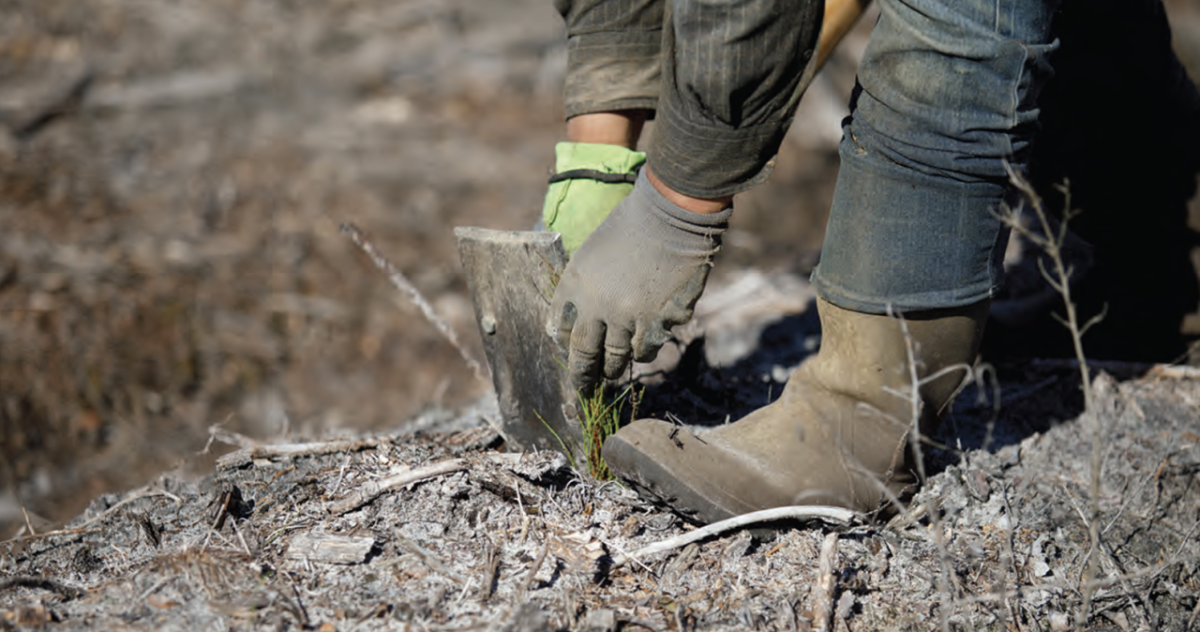Rayonier 2022 Sustainability Report: Sustainable Forest Management
Sustainable forest management involves a perpetual cycle of planting trees, allowing those trees to grow, harvesting those trees for use in various forest products, and then replanting new trees to begin the cycle anew.
Published 09-05-23
Submitted by Rayonier

Rayonier first commenced a plantation forestry program in the late 1940s, marking the beginning of our perpetual cycle of planting, harvesting, and replanting our forests. Since then, we have planted well over one billion trees, and that number continues to grow, with more than 38 million seedlings planted in the U.S. and New Zealand in 2022. Approximately two-thirds of our land base is intensively managed, and we are committed to sustainable forestry for timber production to meet the needs of the present without compromising future generations. We aim to achieve this goal by practicing a land stewardship ethic that integrates reforestation with the conservation of soil, air, and water quality, as well as wildlife and fish habitats. The forests we replant enhance and complement the biodiversity offered by the natural forests that exist throughout our portfolio.
SEE RAYONIER EMPLOYEES PLANT 4,000 TREES AT PLANTING DAY.
Research and Development
We operate an in-house research and development effort designed to provide the knowledge, tools, and technology necessary to manage our forests sustainably and to implement effective silviculture programs (i.e., programs to improve the growth and cultivation of trees) across our ownership. Rayonier maintains active research initiatives in the following key areas: (1) genetics and tree improvement, (2) seedling production, (3) biometrics and growth/yield, (4) environmental sustainability (including protection of water, soils, biodiversity, and threatened and endangered (T&E) species), and (5) carbon and climate impact.
In addition to our in-house research efforts, we also collaborate on specific research initiatives with industry associations, other individual industry participants, and university/industry cooperatives. In the U.S., Rayonier is a member of over 30 university/industry cooperatives, which provide us with access to a wide range of basic and applied research programs to support our forest management efforts. In New Zealand, Rayonier staff actively participate in several Forest Owners Association governance and technical committees covering both research and forest health. We also collaborate with the University of Canterbury on a broad range of forest research matters.
DISCOVER HOW RAYONIER SCIENTISTS BRING DEEP KNOWLEDGE TO FOREST MANAGEMENT.

Tree Improvement and Forest Health
A continuous process of research, genetic selection, breeding, and testing enables us to incrementally improve the productivity and value of our forests over successive rotation cycles. We employ conventional tree breeding techniques, such as controlled pollination, and do not plant seedlings that are classified as Genetically Modified Organisms (GMOs). Our tree improvement research efforts are primarily focused on identifying and breeding tree families that grow larger, straighter, and faster, while at the same time having improved timber qualities. Our program is designed to enhance disease and pest resistance through careful genetic selection and site-specific silvicultural applications
We also conduct research to identify more effective silvicultural treatments to increase the survival and growth of the trees we plant. As part of this research, we monitor forest conditions for invasive species, weed competition, tree survival rates, soil conditions, and pests. We apply herbicides (generally below manufacturer-prescribed rates) only where and when needed to control competing vegetation as part of our site-specific forest management operations. Our selection of any such treatment is based on specific site needs as well as the safety and efficacy of any herbicide to be used.
Our research and development programs focus not only on current forestry conditions but also analyze the long-term impacts of climate change and its potential impact on our business. This includes evaluating anticipated changes in weather patterns across regions to assess the potential impacts to long-term forest health and productivity.

Harvest Planning
We rely on our in-house analytical expertise, including wood flow models and other harvest planning tools, to guide our long-term planning as well as our estimates of sustainable yield. We define sustainable yield as the annual harvest level that we believe can be sustained into perpetuity based on measurements of biological growth and the expected productivity resulting from our reforestation and silviculture efforts. Our long-term harvest plans, from which we derive our sustainable yield estimates, typically span 60 years in the U.S. South and New Zealand, and 100 years in the U.S. Pacific Northwest.
Underscoring our commitment to managing our forests on a sustainable basis, we disclose our annual sustainable yield for each of our three primary timber operating segments. Our estimated sustainable yield range of 10.7–11.6 million tons1 increased modestly from the prior year reflecting the additional acreage we acquired in 2022. Our sustainable yield, as well as our overall harvest strategy, are reviewed annually by our Board. Our 2022 harvest volume included final harvests on approximately 93,000 acres, or 3% of our total acreage, with replanting generally occurring within twelve months of harvest.
To learn more, view the full Rayonier 2022 Sustainability Report.
1 Sustainable yield is defined in our 2022 Form 10-K.

Rayonier
Rayonier
Rayonier (NYSE:RYN) is a leading timberland real estate investment trust with assets located in some of the most productive softwood timber growing regions in the United States and New Zealand. We own or lease under long-term agreements approximately 2.8 million acres of timberlands located in the U.S. South, U.S. Pacific Northwest and New Zealand. We are More than trees because we recognize that our 90+ years of success in the timberland industry comes from our people, an empowering culture and the courage to constantly challenge “the way it’s always been done.” Get to know us at www.rayonier.com.
More from Rayonier

